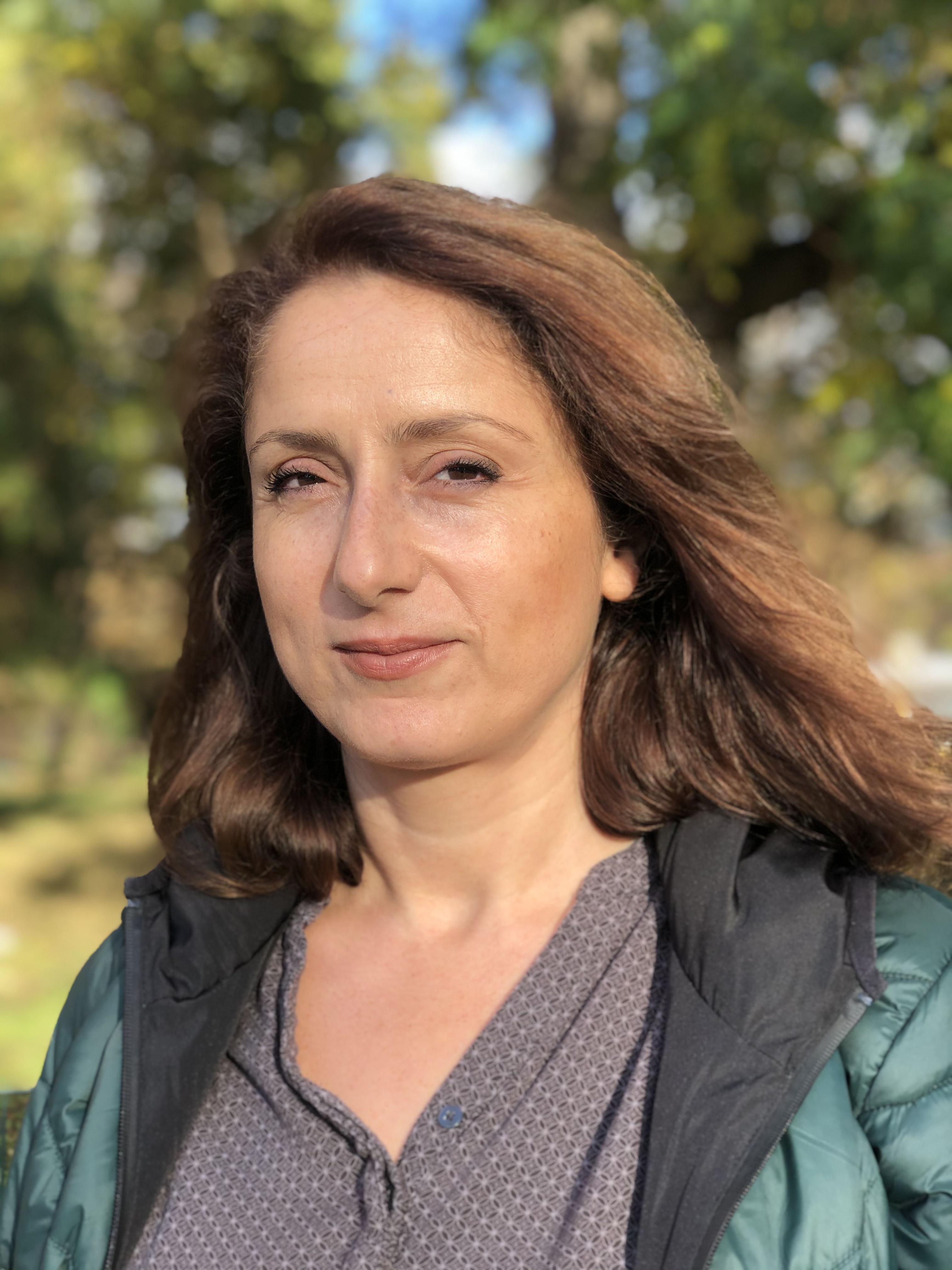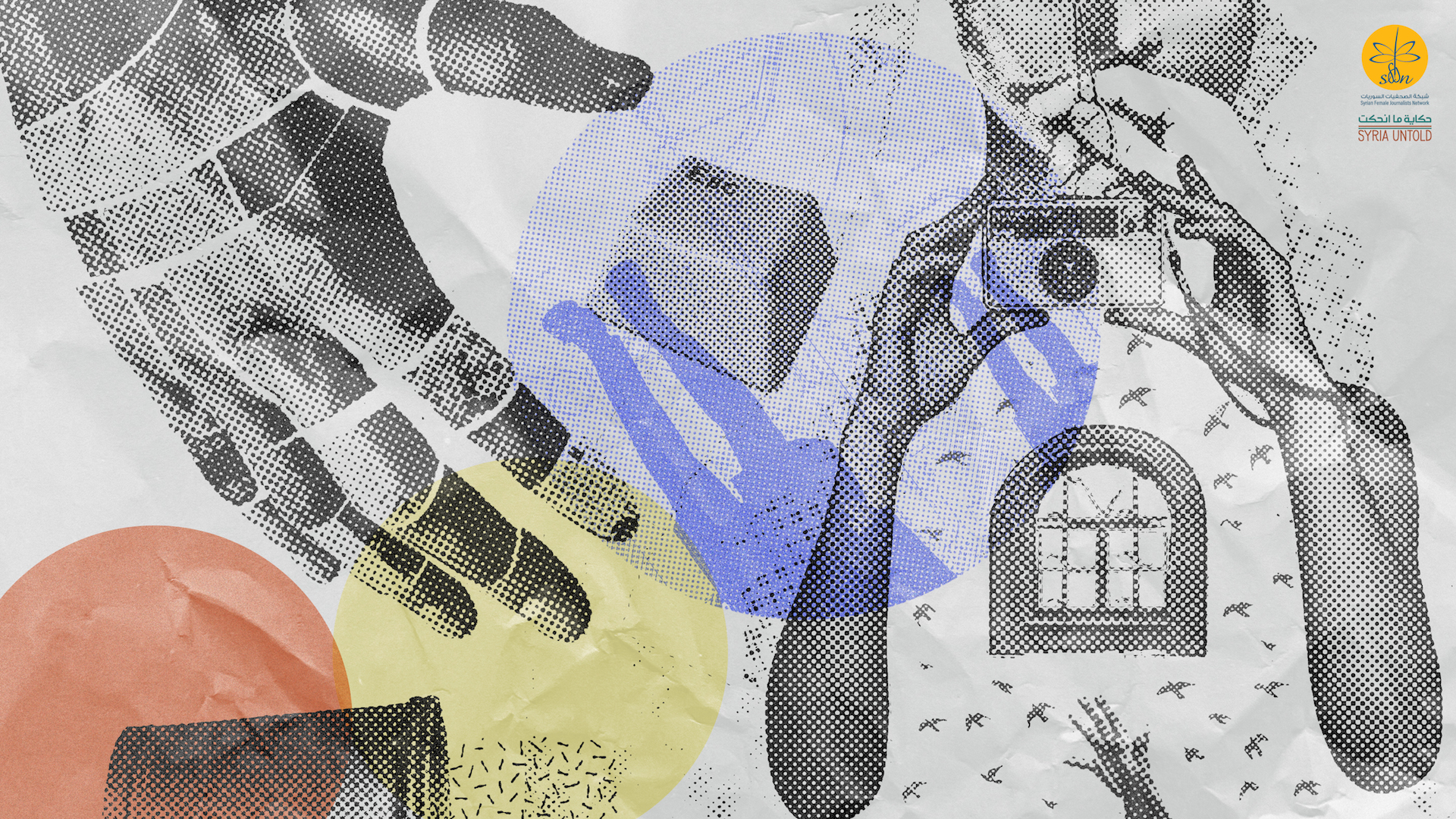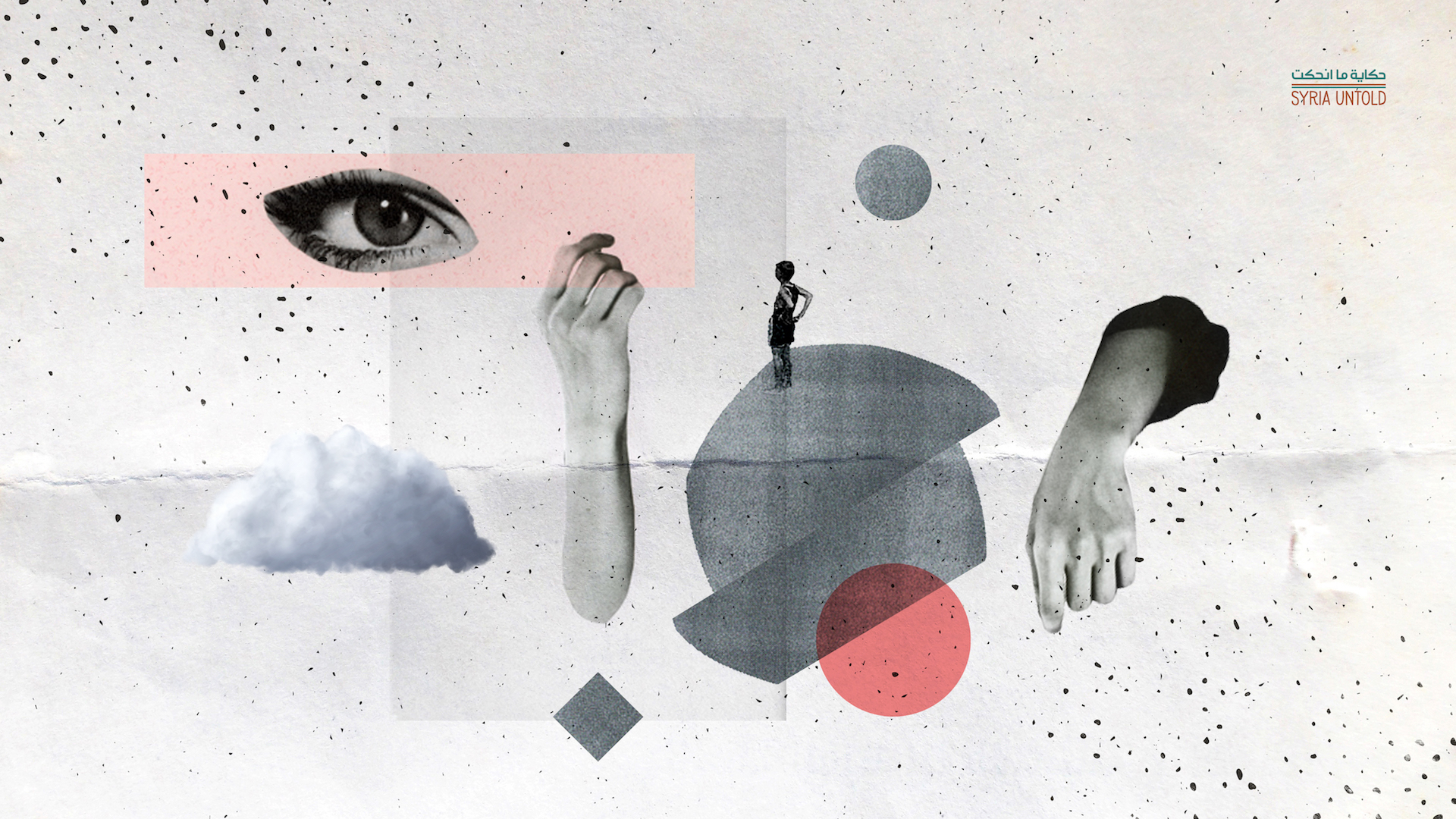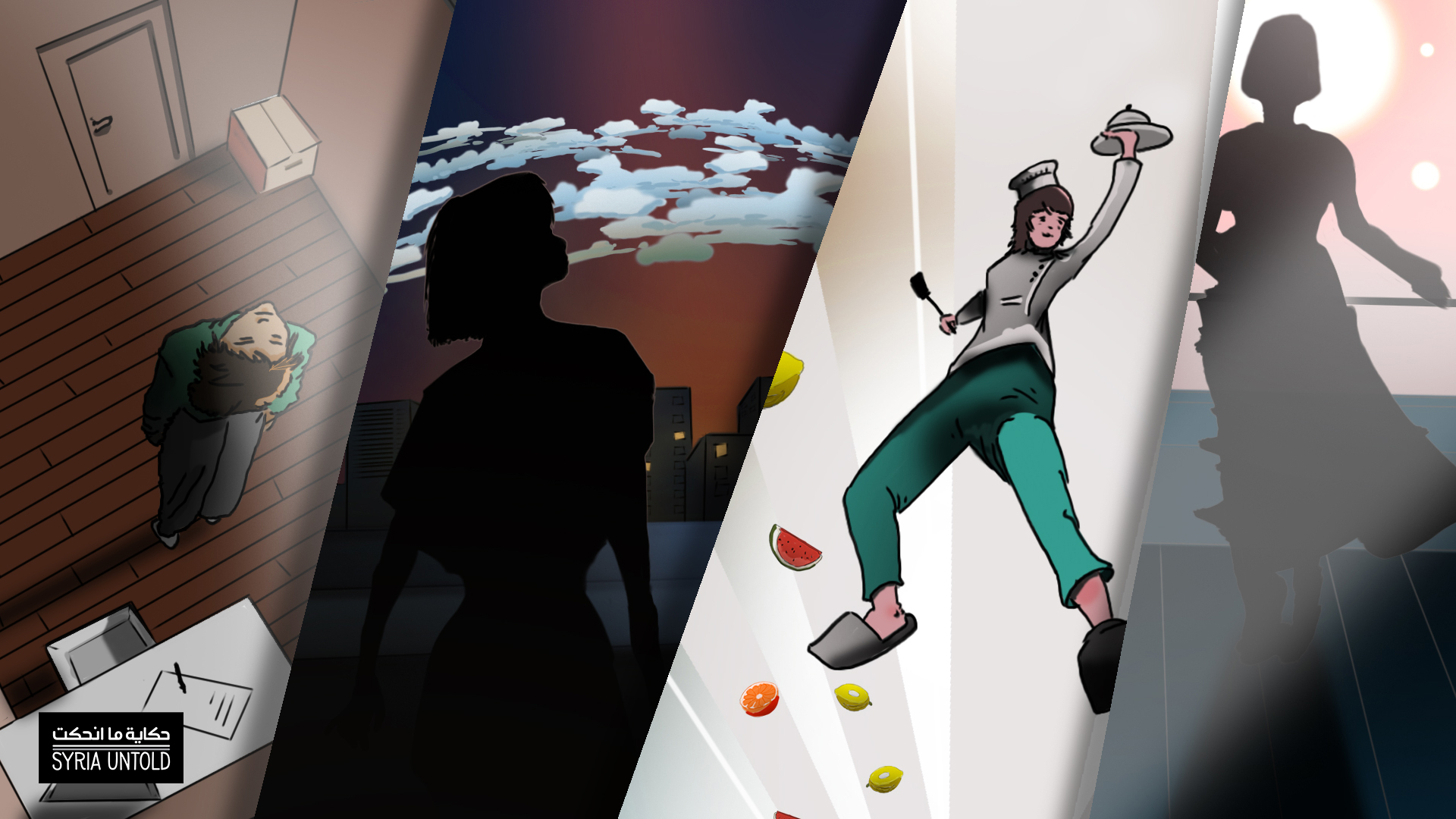This article was published with support from the NewsSpectrum Fellowship Program. Read this piece in German at taz and in its original Arabic at SyriaUntold.
A note to readers: This article mentions sexual abuse.
"Finally, I divorced him. We had been married for eight years, eight years without love, and I didn’t have one orgasm. The worst part was that I eventually realized that what I had experienced in all those years was nothing but rape."
In Zoom, interactions are limited to a small rectangular frame. The person you're talking to becomes something like a crumb of themselves. On the monitor, I see a woman in her late twenties with short, casually groomed hair. We’ve agreed to meet virtually so that I can interview her for this article, one of many I’ve been writing recently about love and sex among Syrian women in Germany.
Nimat pushes away a pile of books and papers sitting to her right so she can move her arm to gesture as she speaks. “Please excuse the mess.” She has no desire to buy a bookshelf, she says, because she keeps most of her things in just two bags on top of the closet. They are easy to pack up and carry whenever she decides to move for a job or a better life. Unless, of course, everyday life, bills and tax payments should one day consume her, leaving no time to dream.
‘Don't pay attention to what she says’
Nimat isn’t her real name. In 2015, she fled her home country Syria with her husband, crossed from Turkey to Greece by sea like tens of thousands of other people, and from there made it to Germany on foot. She had married a few years earlier, in February 2011, shortly after her 18th birthday. It was an arranged marriage. “Don't pay attention to what she says," her mother advised the new son-in-law on their wedding day, knowing Nimat was terrified. "Today is your day." He was several years older. The marriage was to be consummated on the very first night, no matter how many times Nimat asked for time to adjust beforehand.
Mending what has been broken
12 February 2021
The drama queen of quarantine
23 June 2020
Nimat’s mother never taught her about the female body or about sex, nor did her school. There were so many questions that she was either too shy for or simply didn’t know to ask. For one, Nimat didn’t understand why her otherwise loving mother told her groom to “take her virginity” from day one. That wedding night, full of tension and ignorance, shaped her relationship with her husband and continues to shape her life to this day.
Ten years later, Nimat once asked her mother during a phone call if she was circumcised. "Of course not! What's wrong with you?" her mother asked, aghast. Female genital mutilation is not traditionally practiced in Syria, but Nimat no longer understands her body. She can't relax. Her body seems to recoil when others touch her, she says. Nimat is uneasy with physical affection, and to this day, although she has been divorced for several years and has had several partners since then, she has not experienced sexual climax.
According to the traditions of Nimat’s home village north of Damascus, the newlywed husband waits at least two days before his second nocturnal “attack,” so that the wound supposedly caused by the deflowering of the bride can heal and the pain subsides. But Nimat's pain from that first night did not stop, and neither her husband, her mother nor her mother-in-law found solutions. The pharmacist her mother took her to gave Nimat an anesthetic for her to apply "down there" to ease the physical pain. No one cared that, emotionally, Nimat now felt nothing at all.
The thing that cannot be postponed
"I put up with him lying on top of me for 15 minutes at a time, and he also made quick work of it because he realized how it disgusted me,” Nimat tells me.
After a year of marriage, Nimat probably would never have understood what was so significant about sex if she hadn't been caring for displaced people at the start of the Syrian uprising. As part of her work, she witnessed dozens of conservative families housed in a school building on the outskirts of Damascus. Workers installed makeshift showerheads in the public bathroom stalls. Married couples lined up in front of the six "showers" to perform quick conjugal intercourse, only to finish, leave and let the next couple in immediately afterward. No one was bothered by the sounds coming through the thin doors because, for one thing, they were performing a religious duty, and for some of them, eating, going to the bathroom and having sex were their only ways to cope in the face of death. Nimat just didn't understand what it was about sex that was so impossible to postpone.
One night, she turned her back to her husband, who was sleeping next to her, and touched herself. "What are you doing?" he shouted when he woke up. He slapped her hand. Nimat felt hatred and self-loathing. "I was something like a toilet for him, into which he pees and then goes away. I hoped that at least here in Germany I would be able to hold him accountable for that, even if he may never have realized that he was raping me the whole time." Through the camera, Nimat still blushes with anger and her voice falters.
In some religious families, girls are taught to use sex so that they can control their husbands with it. "In my family, the more pious women read what they could use for their own good from hadith collections, books about tradition and the prophet's biography," Nimat says. But neither she nor her husband was religious, so that path was not open to her either.
No one was bothered by the sounds coming through the thin doors because, for one thing, they were performing a religious duty, and for some of them, eating, going to the bathroom and having sex were their only ways to cope in the face of death.
Doctor’s advice
Nimat's sexual frustration became a psychosomatic condition, she tells me. Her doctor, a German woman, said she was “familiar” with this condition among "women from the Middle East" and prescribed her a libido booster. Nimat moves closer and closer to the camera and almost shouts at me: "I don't have a problem with my libido! I don't need sex pills! The curse on me is my femininity. This doctor didn't even ask me what I was suffering from." Perhaps she didn't know what to ask a young woman in a headscarf either, Nimat reflects.
Nimat had always thought of herself as strong. When she was 10, she spoke out against her father’s friend, who had sexually molested her, causing him a “scandal,” in her words. The man eventually had to move. Years later, during the war, she traveled every week from her village to Damascus to study engineering, despite all the dangers—she wanted to show the world a tough face.
My childhood friend, now a ghost
18 September 2020
Raqqa, at the center of the universe
16 August 2020
But when she arrived in Germany in 2015, Nimat was burnt out. She just wanted to sit in the dark. She suffered from depression, and, unlike most of her compatriots in Germany, hated the sun. Still, her psychiatrist didn't seem curious about her personal life.
"It was enough for him that I had fled war and so he talked about things that all my acquaintances here had to hear. Trauma, vitamin D, drinking lots of water..."
Among refugees, this advice from German doctors or psychologists has become a popular joke. In diaspora-focused chat groups, many Syrians here complain that their personal suffering and physical symptoms are not taken seriously, but instead are simply generalized as consequences of exile and war.
Dreams remain dreams
"Contrary to what I had always dreamed, I didn’t want to go to Syria for a visit first thing after getting my German passport. Not only out of fear of the inevitable doom that could happen to me there, but also to protect the images of my childhood and youth that I still have in my memory of Syria. And keeping in touch with my closest friends there has become an additional burden of despair and anguish, against which I can only send money whenever I'm able."
Nimat sees her relationship with Germany as one of mutual benefit, a kind of contract she's been in since she arrived here as a refugee: This country offers her relative protection, freedom of movement, social security and the opportunity to study and work. In return, she offers her labor and pays taxes. She doesn’t have to fear deportation because she has learned to trust the rule of law and its institutions, quite unlike in Syria. For her, German citizenship was something like "a testimony of recognition for six years of toil and struggle, the likes of which a German cannot imagine when handing out grades for integration, and for having to prove at every moment that I deserve to live here as an equal."
Her German peers are financially secure, have had life, love and sexual experiences. Meanwhile, Nimat feels she must bridge a gap of 10 years, if not a lifetime. "It's a race that will never end as long as I have a foreign name and accent," Nimat says.
In 2017, she enrolled at a university in Thuringia, a state in central Germany far enough away from her original residence to have to move there. Nimat never returned to her marital home. She filed for divorce, which her husband agreed to in 2018. For a year, he tried to win her back, but to no avail.
Trauma, vitamin D, drinking lots of water... Among refugees, this advice from German doctors or psychologists has become a popular joke.
A relationship on crutches
Nimat began to search for healing. Her body was wounded and she couldn’t understand it. "I thought maybe love was the solution," she says. "In the fall of 2019, a year and a half after my divorce, I fell in love with a young man here who, like me, had experienced violence and alienation. But even that didn't save me from having to fake the orgasm. My body just wasn't playing along, and I believed it was because I needed much more love from my partner. I realized that we probably wouldn't be able to heal each other, and so we broke up."
Nimat moved into her own apartment for the first time in her life, in a small village near Weimar, and continued her studies in civil engineering. Even before the covid pandemic, there weren't many opportunities to meet potential partners there. The men she met in her circle of acquaintances also struggled with their relationships to their own bodies due to “miserable experiences,” says Nimat. They knew as little about sex as she did, or seemingly only knew about it from pornography. They had misconceptions about women and had only ever had secret relationships that involved guilt, where they played tricks with their faith and pretended to God that they weren’t sinners.
"I can't understand how such losers think they are entitled to a virgin with a flat belly and big breasts, preferably with a headscarf," says Nimat. She stands up and shows me the cellulite on her belly, the result of repeated weight gains and losses. She says the best relationship she's had so far was with a man who had previously been with a German woman. "That woman had taught him how to handle a female body and his own. But later he remembered that yes, I am Arab, and his behavior turned dominant and jealous.”
The cloth of prejudice
At one point, Nimat made a difficult decision: she took off her headscarf and showed herself in public. She hoped there was no longer anything to indicate where she came from. From now on, she thought, everything would go according to plan. Maybe the time frame would be flexible, but it would be in line with a future she still dreams of—albeit with an uneasy heart.
"I had not been more devout with the headscarf, and I am no less so without. However, I now face resentment from my family and I am attacked and blocked on social media. But at least I no longer have to deal with people who wanted to patronize, marry or even 'save' me because of my headscarf. And most importantly, I'm rid of the framing of Germans who previously saw me as weak and unworthy."
Taking off the hijab takes courage, especially for a divorced woman. Nimat feels that were she still in her small hometown in Syria, she would never have dared to remove it.
Still, Nimat does not feel freer or stronger now than before just because of her new appearance. Her flying hair does not carry her into a world where all women are free. Nor does she cheer those who think Islam covers not only the hair but also the mind. In fact, nothing has changed. Her fellow students at the university greeted her normally, talking as usual about where they applied for jobs or internships. No one congratulated her on her bold move, and no one tried to hide criticism or astonishment. Nor did she look askance at other female students when they, too, suddenly walked through the wide hallways without headscarves. It seemed that many of her fellow students had made the same pragmatic decision completely without prior agreement: so close to graduation and entering the job market, the opportunities without headscarves would now be better but... not fairer at all.
It takes a lot of courage for women from Nimat’s society to demand their rights to sexual pleasure. A dildo that costs no more than 15 euros can be a cheap alternative to all the problems she will face if she insists on her rights, even with a husband. If she has sex outside of marriage, she is often stigmatized as a “whore.” And this does not only affect Muslim women—customs and traditions surrounding women and sex overlap across Syria. Finally, it is a shame that in Syria, marital rape is not a legal offense.
Nimat's story is not an isolated one. There are no statistics on how many Syrian women separate from their husbands after fleeing to Germany, but in the relevant social media and in women's solidarity groups I often see intense discussion about how and whether divorces happen. Women complain about disappointed relatives accusing them of having come to Germany only to get divorced here.
Still, Nimat is trying to move forward as best she can. "I feel that I am divine, I created myself and I love this person. I also love life, and am grateful for it, despite everything that was stolen from me: my childhood, my sexual health and my dreams. But above all, I no longer consider my womb a curse.”











